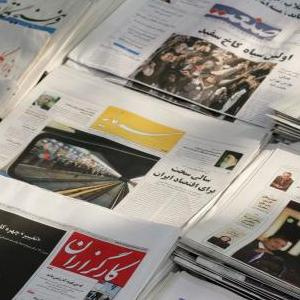Tehran's Daily Newspaper Review

Six weeks before the parliamentary elections, Iran criticized Majles for delaying vote on the Election Law Reform bill which proposed a closer scrutiny on candidates’ spending, while lawmakers have been accusing the government with a secret agenda to enter its supporters into the parliament through lavish funds. The newspaper also interviewed Sowlat Mortazavi, director of the election bureau of the Ministry of Interior, who rejected speculations about vote-rigging, calling it “the work of pathetic people.”
Jomhouri-ye Eslami’s top news was a report on the memorial service held for nuclear scientist Mostafa Ahmadi-Roshan and his driver Reza Qashqaei, assassinated on Wednesday last week. “Assassinations could not hinder Iran's scientific progress,” the newspaper quoted several high-profile attendants. The newspaper also reported from Ramin Mehmanparast, Foreign Ministry Speaker, who welcomed P5+1’s return to the table of nuclear negotiations with Iran. The speaker also stressed that no (positive) changes have occurred in Tehran-Washington relations. Jomhouri-ye Eslami’s editorial slammed Ban Ki-Moon, calling him “anti-nations Secretary General” for his call on Hezbollah’s disarmament during his recent visit to Beirut.
Kayhan’s top headline was a quote from Nikolai Patrushev, Secretary of National Security Council of Russia, who mocked the US repeating claims within the past ten years of Iran's ability to manufacture an N-bomb in a week. Kayhan also quoted the Tunisian Islamists’ spiritual leader Rachid al-Ghannouchi who had made an interview with Fars News Agency, saying that “Iran is the region’s democracy model.” The newspaper’s editorial praised the nuclear achievements of young Iranian scientists, while arguing that sanctions against Iran have been futile.
“Iran will circumvent oil embargo” Resalat quoted former IRGC commander and incumbent oil minister Rostam Ghasemi. The newspaper also quoted FM Ali-Akbar Salehi who stated that Amano’s apology for leakage of the name of Iranian nuclear scientists (resulting in their assassination) is now useless. Resalat also reported that the Supreme Council of Cultural Revolution –the most powerful cultural arm of the state- has approved Farhad Daneshjou’s election as head of the Islamic Azad University. In its harsh editorial, in response to Saudi Arabian officials’ suggestion of replacing Iranian oil in the global market in case of a new embargo on Tehran's energy sector, Resalat said that as much as Iran is prepared to block the Strait of Hormuz, it is able to drag down Riyadh’s oil exports to no more than a handful.
Shargh’s top news was on the skyrocketing price of gold in the Iranian market, a price which has nearly doubled since last year. Ali-Akbar Salehi’s warning to Riyadh to “avoid imprudent remarks” such as promising to produce 12 million barrels of oil per day to compensate Iran's removal from the oil market in case of a new sanction against the country. Shargh also reported that Farhad Daneshjou’s presidency over the academic giant Islamic Azad University hinges upon Hashemi Rafsanjani’s approval as the head of the university’s Board of Trustees.
Tehran-e Emrooz interviewed Mohammad-Nabi Habibi, leader of the archconservative party Mo’talefeh, who warned about the presence of pro-Mashaei candidates in the ninth parliament. The newspaper also explored the root of Qatar’s regional policy following the Arab Spring. Doha is trying to receive a bigger share corresponding to its economic power Tehran-e Emrooz argued, playing within a game devised by the US. The newspaper also criticized Esfandiar Rahim Mashaei and Hamid Baqaei –both close aides of Mahmoud Ahmadinejad- terms of presidency over the Cultural Heritage Organization, asking the president why he had praised their record during the inauguration of the new head of the organization Seyyed Hassan Mousavi.
* Notes:
The editorial section of Iranian newspapers is not the work of the editor-in-chief or the senior editorial staff of the newspaper by default, but can be a contribution by experts and politicians (typically agreeing with the newspaper’s political stance.) The newspapers may also occasionally publish without an editorial.
Vatan-e Emrooz daily does not publish on Thursdays.
Trouble with understanding some terms? Check our Glossary of Iranian Political Terms.
Briefing
Iran is the official organ of the administration. Its current editor-in-chief is Ali-Akbar Javanfekr, former media advisor to President Mahmoud Ahmadinejad.
Jomhouri-ye Eslami (The Islamic Republic) was known as the official organ of the Party of the Islamic Republic, founded in 1979 and disbanded in 1987. Currently, it is an open critic of Mahmoud Ahmadinejad's policies and is known to be a mouthpiece of Akbar Hashemi Rafsanjani.
Kayhan (Universe) is a hard-line conservative newspaper. Its editor-in-chief –currently Hossein Shari’atmadari- is directly appointed by Iran's Supreme Leader. Shari’atmadari’s editorials often spark off controversy and debate inside Iranian political circles.
Resalat (Mission) belongs to the moderate wing of the Principlist camp. Resalat’s best known analyst is Amir Mohebbian, its political editor.
Shargh (East) is a moderate Reformist newspaper. It was the most popular and influential Reformist newspaper in its first period of publication which lasted from August 2003 until September 2006.
Tehran-e Emrooz (Tehran Today) is a “Principlist/Reformist” newspaper, connected to Mohammad Baqer Qalibaf, Tehran Mayor and a likely candidate of the 2013 presidential election.

